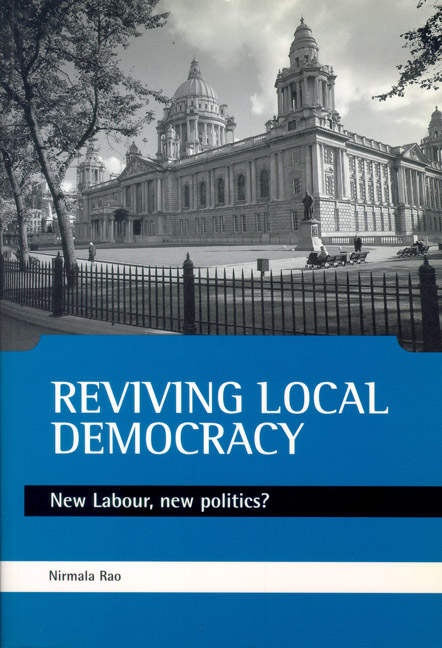Book contents
- Frontmatter
- Contents
- List of tables
- Acknowledgements
- one New times for local democracy
- two Local democracy and after
- three The failed promise of reform
- four Civic-minded Britain?
- five The reluctant voter
- six The third way and democratic reform
- seven The modernising agenda: enhancing participation
- eight The modernising agenda: new forms of political leadership
- nine Prospects for a new politics
- Bibliography
- Appendix A The surveys
- Appendix B The legislation
- Index
one - New times for local democracy
Published online by Cambridge University Press: 05 July 2022
- Frontmatter
- Contents
- List of tables
- Acknowledgements
- one New times for local democracy
- two Local democracy and after
- three The failed promise of reform
- four Civic-minded Britain?
- five The reluctant voter
- six The third way and democratic reform
- seven The modernising agenda: enhancing participation
- eight The modernising agenda: new forms of political leadership
- nine Prospects for a new politics
- Bibliography
- Appendix A The surveys
- Appendix B The legislation
- Index
Summary
This book is about New Labour's plan for the modernisation of local democracy. The election of the Blair government in May 1997 precipitated an intense debate about local government: local authorities, it was said, had failed to adapt themselves to the challenges of the late 20th century. Public indifference, voter apathy and declining trust in the institutions of representative government justified urgent measures to reform the ways in which councils connected with their communities. Behind this programme lay a more fundamental critique of a deeper process of mismatch between popular expectations and governmental performance. The 19th century institutions of representative democracy had outlived their usefulness, not just in Britain but worldwide. The need for renewal was comprehensive, and local government provided a useful point of entry for the ‘democratisation of democracy’.
In terms of concrete proposals, however, there was much that was familiar in the package put forward in the 1998 White Paper, Modern local government: In touch with the people. Proposals for enhancing public participation through local forums, and through changes in electoral procedures, had an element of novelty about them. However, other parts of the package – notably the transformation of decision-making structures through the creation of separate local executives or elected mayors – covered ground already well-trodden during the previous 40 years. The distinctiveness of New Labour's proposals lay less in their substance than in the passion with which they were advocated and the political commitment with which they were enacted.
Bringing passion into politics is risky: one may become beguiled by one's own rhetoric, pursuing policies that are strong on symbolism and weak on actual achievement. New Labour was not immune to this risk. ‘Modernisation’ became a slogan: an assertion that change is needed. That need cannot be assumed, but must be demonstrated. Widespread ignorance and apathy cannot be reconciled with the democratic health of a nation. Few would dispute that low turnouts in local elections signify a weakness in the democratic process and bringing councils more closely in touch with local people through new mechanisms for participation can be readily justified. To that extent, reforms of the type proposed may be defensible.
It is less clear that changing the ways in which local authorities make their decisions by creating a special class of ‘executive’ councillors is necessary to improve the efficiency of local government.
- Type
- Chapter
- Information
- Reviving Local DemocracyNew Labour, New Politics?, pp. 1 - 6Publisher: Bristol University PressPrint publication year: 2000



